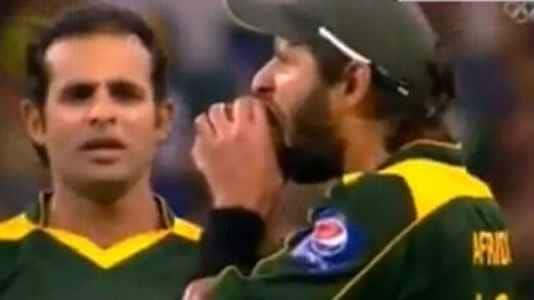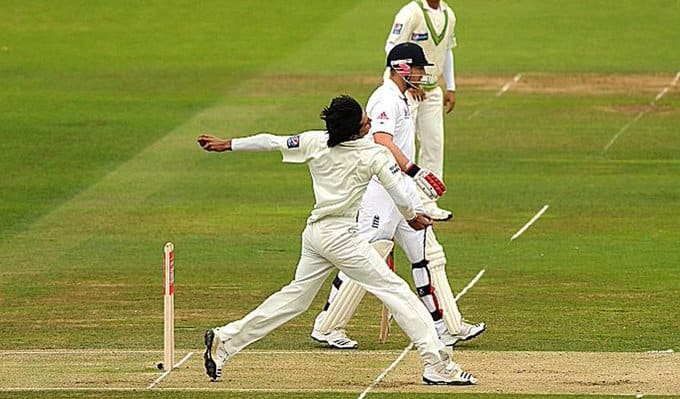

.jpg)
2010 spot-fixing scandal rocked the foundation of Pakistan cricket (X)
Cricket in Pakistan has often walked a tightrope between triumph and turmoil as it has frequently caught itself out in the slips of controversy.
The nation’s passion for the sport is rivalled only by the scale and sensation of the scandals that have rocked its foundations.
From on-field antics that left fans and officials stumped to off-field dramas that would make a soap opera look tame, Pakistan cricket has seen it all.
Let’s take a detailed look at the top five biggest controversies that have rocked the boat of Pakistan cricket.
 Shahid Afridi tampering the ball in 2010 (Twitter)
Shahid Afridi tampering the ball in 2010 (Twitter)
During a January 2010 ODI at the WACA, Pakistan’s stand-in captain Shahid Afridi was caught on camera biting the ball multiple times.
This incident occurred as Australia needed 35 runs from 30 balls. The TV umpire notified the on-field umpires, leading to a ball change and a reprimand for Afridi.
After the match, which Australia narrowly won, Afridi faced the match referee, admitted his actions, and apologised. Despite his remorse, he was swiftly banned for two T20 Internationals.
.jpg) Bob Woolmer’s death still remains a mystery (Twitter)
Bob Woolmer’s death still remains a mystery (Twitter)
The cricket community was stunned on March 18, 2007, when Pakistan’s head coach, Bob Woolmer, was discovered unconscious in his hotel bathroom in Jamaica, just after Pakistan’s shock defeat to Ireland in the 2007 ICC World Cup.
Despite immediate efforts to save him, Woolmer passed away, triggering intense speculation and a thorough investigation by Jamaican police. However, the investigation yielded no definitive conclusions about the cause of his death.
Rumors circulated that Woolmer was preparing to expose cricket’s underworld of match-fixing and bookies, leading some to speculate that this knowledge may have contributed to his untimely death.
.jpg) Shoaib Akhtar & Mohammad Asif were banned for doping (Twitter)
Shoaib Akhtar & Mohammad Asif were banned for doping (Twitter)
In a significant doping scandal, Pakistan’s leading bowler, Shoaib Akhtar, was handed a two-year ban, while his teammate Mohammad Asif received a one-year suspension on November 1, 2006.
The bans followed a ruling by a three-member doping tribunal of the Pakistan Cricket Board, which found both players guilty of using the banned steroid nandrolone.
The scandal initially broke on October 16, when both players were withdrawn from the Champions Trophy in India after testing positive for the performance-enhancing drug.
.jpg) Inzamam-ul-Haq’s Pakistan forfeited the Test after they were accused of ball tampering (Twitter)
Inzamam-ul-Haq’s Pakistan forfeited the Test after they were accused of ball tampering (Twitter)
In a historic twist during the 2006 Oval Test, tensions flared on the fourth day as umpires Darrell Hair and Billy Doctrove accused Pakistan of ball-tampering, awarding England five penalty runs.
This charge, deemed unfounded and insulting by the Pakistani team led by Captain Inzamam-ul-Haq, prompted them to protest by not returning to the field after the tea break.
As the delay continued, the umpires interpreted it as a forfeiture under cricket laws, leading to the unprecedented decision to award the match to England.
This marked the first time in Test cricket’s 130-year history that a match was forfeited, igniting widespread debate and controversy over the incident and its handling.
 Mohammad Amir deliberately bowling a no-ball (Twitter)
Mohammad Amir deliberately bowling a no-ball (Twitter)
The 2010 spot-fixing scandal remains one of the most infamous chapters in cricket history. During the Pakistan team’s tour of England, explosive allegations emerged, implicating key players in a nefarious spot-fixing scheme.
The core of the controversy involved then-captain Salman Butt, fast bowlers Mohammad Asif, and young Mohammad Amir, who were caught in a sting operation by a tabloid newspaper working with a bookmaker. The players were found guilty of deliberately delivering pre-arranged no-balls during the Lord’s Test, a deceit captured on camera and backed by damning evidence.
The revelations shocked the cricket world, leading to immediate scrutiny and subsequent trials. In November 2011, all three players received prison sentences and were imposed significant bans from cricket by the International Cricket Council (ICC). The scandal not only devastated the careers of these players but also severely tarnished the integrity of Pakistan cricket.